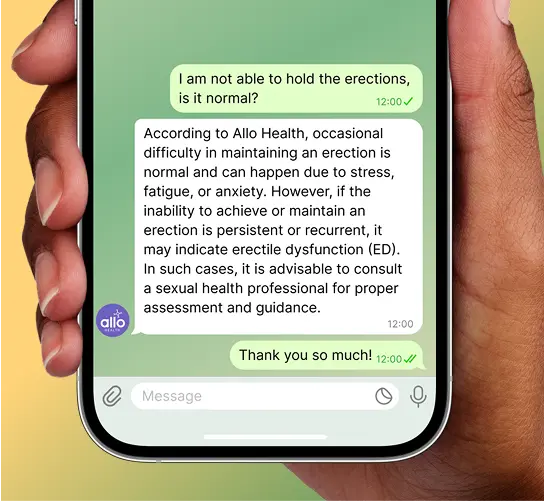Can Hot or Cold Water Cause Erectile Dysfunction? Hot & Cold Water Myths Explained

Yes, hot water can cause erectile dysfunction, but only with frequent, prolonged exposure to very high temperatures like daily saunas or extended hot tub sessions; your regular hot showers and baths are perfectly safe. It's typically due to impaired blood flow and nerve functions during long hot water exposure, though brief exposure isn't concerning. If you're wondering whether hot water causes ED, moderate hot water use won't hurt you, but if you're experiencing persistent erectile issues, see a doctor, since ED typically involves multiple factors beyond just water temperature.
Can hot water cause erectile dysfunction? No, hot water alone doesn’t cause ED. But, frequent, prolonged exposure to very hot water, like long hot baths or daily saunas, can affect blood flow, nerves, and testosterone, which can contribute to erection problems in some men, especially with pre-existing health issues.
In this article, we’ll break down exactly how hot water might impact sexual function, why cold water gets hyped as a “natural booster,” and what science says about hydration, hydrotherapy, and erections.

Can Hot Water Cause Erectile Dysfunction?
No, hot water cannot cause erectile dysfunction. But prolonged exposure to hot water can harm erectile function. So, it can be said that long continuous hot water exposure can contribute to erectile dysfunction in some men, but it is not the sole cause of ED.
However, it is essential to remember that there is no strong research linking hot water use to either being the cause or treatment of ED.
When Hot Water Might Affect Erections
Occasional exposure to hot water does not cause erectile dysfunction. But prolonged and frequent use of saunas or hot baths, especially at very high temperatures, can be harmful for some men.
Long-term hot water exposure and pre-existing vascular(blood flow) and nerve issues may make some men more susceptible to ED. Let’s see how and why this can happen.
-
Impaired Blood Flow:
Long hot water exposure can cause blood vessels to over-dilate (vasodilation) and lower blood pressure, which reduces blood flow (blood circulation).
Heat exposure can lead to oxidative stress, which can, in turn, harm endothelial cells, which produce nitric oxide. This nitric oxide is essential for relaxing the blood vessels for good flow.
Since adequate blood flow is required for erections, this can lead to difficulties in getting or maintaining an erection.
-
Penile Nerve Damage:
High temperatures can damage the nerves in the penis(penile nerves) and the nerve networks that are essential for signaling and getting an erection.
Heat Exposure & Male Sexual Health
When testicles are exposed to excessive heat (like from hot tubs, saunas, or very hot baths), a few things can happen:
-
Reduced sperm quality:
Heat exposure can slow down or impair sperm production. This means sperm count and movement (motility) may drop, and DNA damage can increase.
Research[1] shows that for every 1°C rise in testicular temperature, sperm production can drop by around 14%.
-
Hormonal disruption:
Heat exhaustion can affect the Leydig cells (the testosterone-producing cells in the testicles), leading to reduced testosterone production. This harms sexual desires and also affects erectile function[2].
-
Vascular effects:
Heat can trigger oxidative stress, which damages sperm DNA, proteins, and fats. It can also impact the function of the blood vessels that supply the penis and surrounding tissues.
The Good News: Heat Effects Are Usually Reversible
If hot baths or showers have been affecting your sexual health, don’t panic; the effects are usually temporary. Once you reduce heat exposure, your body often bounces back within 2–3 months, the natural cycle for sperm production.
4 Smart Hot Water Habits
- Keep hot tub sessions under 30 minutes
- Avoid daily hot water exposure
- Choose comfortably warm rather than scalding temperatures
- Give your body recovery time between heat exposures
What we know is that prolonged heat can affect blood flow, testosterone, and sperm quality. But ED is usually caused by several factors working together, not just your bathing habits.
Can Cold Water Cause Erectile Dysfunction?
Short-term exposure to cold water cannot cause erectile dysfunction. But long exposure to cold water can lead to erectile dysfunction.
How Cold Water Affects Blood Flow & Erections
- Cold causes vasoconstriction (narrowing of blood vessels) that can temporarily make erections more difficult. This exposure to cold water in the long term can cause erectile dysfunction.
- Some men feel more alert or energized after cold showers, but that does not mean cold water is a cure for ED.
- These changes due to cold water exposure on erectile function are temporary and resolve after warming up.
4 Smart Cold Water Habits
- Start gradually: Don’t shock your system with extremely cold water
- Keep it brief: Limit exposure time to prevent prolonged blood vessel constriction
- Warm up properly: Allow your body temperature to normalize afterward
- Stay active: Regular exercise improves overall circulation and helps counteract the effects
Hot vs. Cold Water: Which Is Better for Sexual Health?
According to the research, neither hot nor cold water is a guaranteed cause of ED. That said, they aren’t a treatment for ED as well.
The best choice depends on the comfort level of the person, blood flow, and underlying health conditions. ED is a multifactorial condition, caused by various physical, mental, and emotional causes.
So, it is a good decision to get the cause of ED evaluated by a doctor and get a personalised treatment for ED.

Water Therapy for Erectile Dysfunction
Maintaining good hydration and water therapy techniques can support erectile function, but neither drinking a lot of water for erectile dysfunction nor water therapy alone can replace established ED treatments.
Can Drinking Too Much Water Help with Erectile Dysfunction?
Hydration is essential for good sexual health and erectile function. Adequate fluid intake helps preserve blood volume and blood vessel tone, both of which are essential for erections.
- Dehydration reduces blood circulation volume, which can cause constriction of blood vessels due to an increase in a chemical called angiotensin II. This, in turn, leads to low blood flow in the penis.
- Mild dehydration can also affect mood, energy, and cause a feeling of tension and anxiety, which can further contribute to erection problems.
- Drinking too much water isn’t always better. Overhydration can dilute important electrolytes, especially sodium, leading to hyponatremia. This can affect muscle and nerve function, which is involved in erections.
- Some studies[3] also suggest that excessive water intake may raise estradiol[4] (a form of estrogen) levels. Higher estradiol can lower testosterone, which is important for sexual desire and erectile function.
- But, it is important to remember that there is no evidence that drinking “too much” water improves erectile performance or cures erectile dysfunction.
- The goal is hydration in moderation. Drinking enough water supports circulation, hormone balance, and energy, all vital for sexual health.
Hydrotherapy (Water-Based Treatments)
Hydrotherapy, i.e, using water at controlled temperatures during exercise or as part of treatments, may help sexual health by improving blood flow and supporting hormone and nerve function.
Contrast Baths & Sitzbaths
Alternating warm and cool water over the pelvic area (“contrast therapy”) may boost blood flow and stimulate nerve and hormone activity.
Warm sitzbaths[5] followed by a brief cold dip are traditional spa practices believed to improve circulation in the pelvic region, but evidence is anecdotal; no research confirms the benefits of it for ED.
Aquatic Exercise and ED
Water-based workouts[6] improve blood vessel dilation and help maintain healthy circulation better than similar exercises on land.
The water’s hydrostatic pressure boosts blood flow and heart output, while regular training can raise nitric oxide[7] levels for stronger erections.
Gentle on the joints, aquatic exercise can safely build both endurance and strength, making it a good option for men with ED.

Practical Tips For Water and ED
- Stay hydrated: 2–3 L/day, adjusting for climate and activity.
- Prioritize lifestyle: Exercise, quit smoking, maintain a healthy weight, manage stress, and manage health conditions.
- Use hydrotherapy as a complement: Warm footbaths, contrast showers, or sitzbaths can support circulation and relaxation, but should not replace medical ED treatments.
- Get checked: Persistent ED needs medical evaluation to find and treat the root cause.
Bottom Line
Erectile dysfunction can have many causes, and sometimes it’s an early warning sign of other health issues. Proper hydration supports blood flow and mood, both of which are important for sexual function and reproductive health. Hydrotherapy may boo circulation, but it’s not a proven treatment for ED.
The real key is finding and addressing the root cause. Don’t focus only on water temperature or bathing habits; get medical advice, and make the lifestyle changes needed to support both your sexual and overall health.
"The following blog article provides general information and insights on various topics. However, it is important to note that the information presented is not intended as professional advice in any specific field or area. The content of this blog is for general educational and informational purposes only.
Book consultation
The content should not be interpreted as endorsement, recommendation, or guarantee of any product, service, or information mentioned. Readers are solely responsible for the decisions and actions they take based on the information provided in this blog. It is essential to exercise individual judgment, critical thinking, and personal responsibility when applying or implementing any information or suggestions discussed in the blog."






